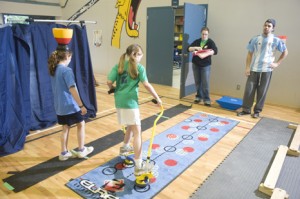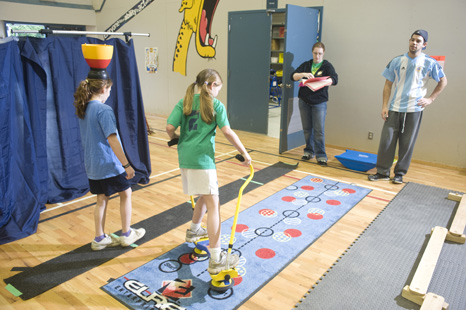Date Posted: July 14, 2011
Print Edition: July 8, 2011
By Alex Watkins (The Cascade)- Email
 UFV is now welcoming the second incarnation of a program and the addition of a complimentary program that will work to develop the motor skills and cognitive functioning of children diagnosed with Fetal Alcohol Spectrum Disorders (FASD). The programs – known as FAST Club and BrainGamer Club – are part of a study called “Strength-Based Interventions for Fetal Alcohol Spectrum Disorders” that UFV is conducting in conjunction with the Universities of Victoria and Saskatchewan as well as Queen’s University, according to FAST Club’s webpage.
UFV is now welcoming the second incarnation of a program and the addition of a complimentary program that will work to develop the motor skills and cognitive functioning of children diagnosed with Fetal Alcohol Spectrum Disorders (FASD). The programs – known as FAST Club and BrainGamer Club – are part of a study called “Strength-Based Interventions for Fetal Alcohol Spectrum Disorders” that UFV is conducting in conjunction with the Universities of Victoria and Saskatchewan as well as Queen’s University, according to FAST Club’s webpage.
Individuals develop FASD when their mothers consume alcohol during pregnancy, leading to brain damage. According to Alison Pritchard-Orr – program director for FAST Club and BrainGamer Club – these children “struggle with learning, memory, and sequencing and have difficulty understanding cause and effect.” In addition, “They often have behavioural issues and accompanying attention deficits.” These characteristics are identified as areas of weakness among FASD children and are therefore traditionally the focus of FASD-related studies.
What makes the study UFV is contributing to unique, however, is the fact that it focuses on improving the relative strengths of FASD children – areas at which “they perform close to typically developing children” – rather than their weaknesses. Pritchard-Orr noted that studies have indicated two main strengths: motor skills and “aptitude for working with computer-based technologies.”
FAST Club – the FASD project originally developed at UFV – works specifically to develop the motor skills of its participants by guiding them through a series of motor skill stations that become progressively more advanced over the duration of the program. While the program focuses on what are identified as each child’s three “top motor skill strengths,” it also allows participants to have a say by including a portion called “choice time” in each one and a half hour session. During choice time, children are allowed to decide which skill they would like to work on.
BrainGamer Club is the newest addition to the study at UFV and is scheduled to begin this fall. The program is directed at FASD children’s technological aptitudes; Pritchard-Orr explained that in BrainGamer Club, “Children will engage in a video game and neurofeedback (biofeedback) program under the supervision of UFV Kinesiology faculty.”
“Success in each game will be determined by a child’s brain wave activity. Altering brain patterns to play fun video games may lead to positive behavioural and cognitive outcomes,” she continued.
With the introduction of BrainGamer Club, families will now be given a choice between two programs for their children to participate in, each developed for a specific area of strength.
Program director Alison Pritchard-Orr noted that her team was “excited to say that we have seen improvements in the children.”
While the data obtained through the first incarnation of the program is still being collected and analyzed, the team has witnessed some more immediately observable indicators of the program’s success. Pritchard-Orr noted: “We have received comments and letters from families of past participants of FAST Club suggesting that our program was one of the few programs that their children were able to follow through with. One child did not know the days of the week but always knew when it was a FAST Club day!”
In addition to these observations, she shared: “Results from our first study have indicated improvements in children’s overall global motor skills as a result of participation in FAST Club. We also saw positive changes in the scores from some of our cognitive tests. These tests are seen as sensitive indicators of brain function… [and so the] positive changes suggest that participation in FAST Club may have resulted in positive changes in overall brain function (specifically attention and executive functioning).”
Both FAST Club and BrainGamers Club are still actively seeking out participants for their 2011/2012 sessions. Pritchard-Orr encouraged families of any children who have been diagnosed with FASD and are “between the ages of 6 and 13 (for FAST Club) or 6 and 16 (for BrainGamers Club)” to email alison.pritchardorr@ufv.ca or call 604-504-7441 (ext. 4755).


